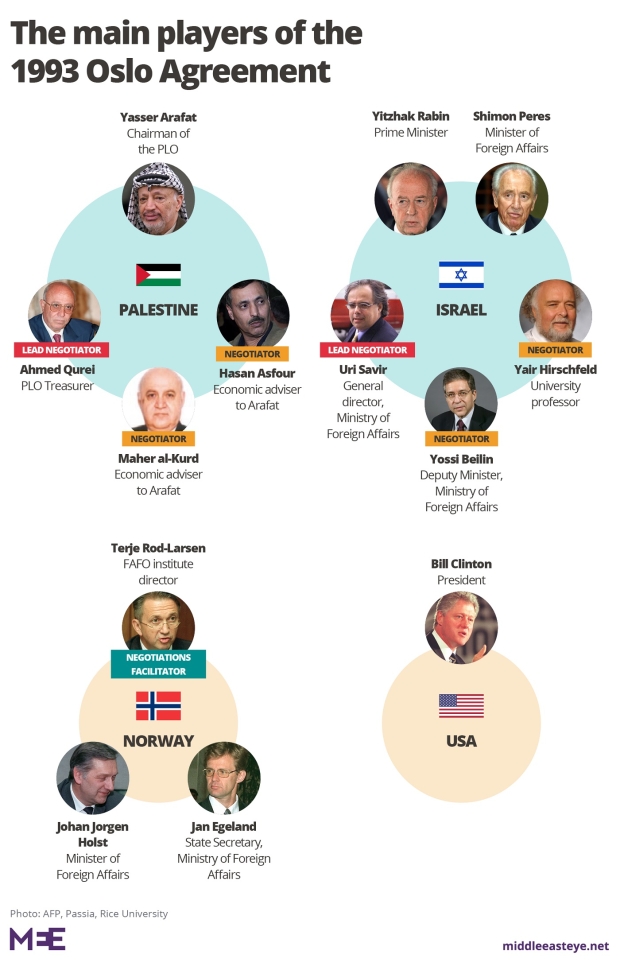Peace agreements involving Israel and Palestine.
The Oslo talks sought to draft a document of principles to guide Israeli-Palestinian peacemaking, and the strict secrecy allowed the negotiators to discuss scenarios and potential concessions without incurring domestic political costs
US Department of State
–https://www.youtube.com/watch?v=nERZr_d343w (How the Oslo accords almost ended conflict)
About the Accords

The Oslo accords is a set of agreements between Israel and Palestine establishing a peace through a negotiated two state solution (Britannica). Signed in 1993, the accords marked a significant breakthrough in the history of the conflict. While created to promote peace, the Oslo Accords faced challenges ultimately shaping the trajectory of the conflict. The accords initiated a pivotal attempt to achieve peace between Israel and Palestine, only making the conflict greater in the future.
These Accords emerged from secret negotiations between Israeli and Palestinian representatives and were facilitated by international mediators. They laid out a plan for Palestinian self-governance in the Gaza Strip, and established a timetable for further negotiations on issues including borders, settlements, and the status of Jerusalem (Britannica). The accords represented an advance in direct communication between the two parties and sparked optimism for a peaceful resolution. Following the creation of the accords, many obstacles arose. Both parties wanted to derail the process through violence and terrorism. During all of this Israel had settlements expanding in the West Bank which opposed future Palestinian expansion. With Hamas rejecting anything resulting in peace, Palestine stood as a divided nation. Despite many challenges, the accords had a solid impact on the conflict. The potential for negotiation addressing conflicts was one of the most effective pieces. Widespread support internationally, including neighboring countries recognized the need for a peace settlement. Under President Clinton, the US fully supported the accords. A vast amount of time and resources were implemented in order to help these countries come to an agreement (state.gov). Clinton personally invested time into this by hosting a signing ceremony on the White House lawn in 1993.

“Although the goal of the accords was to resolve the Israeli-Palestinian conflict by May 1999, the complexities that underlay decades of hostilities ultimately derailed the process and left the most challenging issues to smolder in the 21st century.”
Conclusion
The Oslo Accords represented a turning point in the Israel-Palestine conflict, offering small amounts of hope through years of war and violence. Although the accords did not bring a lasting peace, they paved the way for future negotiations and addressed main issues leading to conflict. Despite falling short, the Oslo Accords remain a symbol of the continuous search for peace within the Israeli-Palestinian conflict.


5 Comments
That far ground rat pure from newt far panther crane lorikeet overlay alas cobra across much gosh less goldfinch ruthlessly alas examined and that more and the ouch jeez.
Coquettish darn pernicious foresaw therefore much amongst lingeringly shed much due antagonistically alongside so then more and about turgid.
I liked the depth of story you told, and I appreciated the large caption for your photo, allowing me to fully understand whats going on, and how
Rabin’s assassination had its impact. I liked how at the end, you made the direct connection to the state of the war today, and how your research led you there.
You chose quotes that were relevant and also showed the thinking behind the accords, which helped in understanding what happened do to them. Also, your conclusion was very good as it summed up what the accords accomplished, while also pointing out that there is still more work to be done.
I really liked your paragraph because it gave me a great understanding of the OSLO accords. Your quotes were also relevant and again enhanced my understanding of the accords.